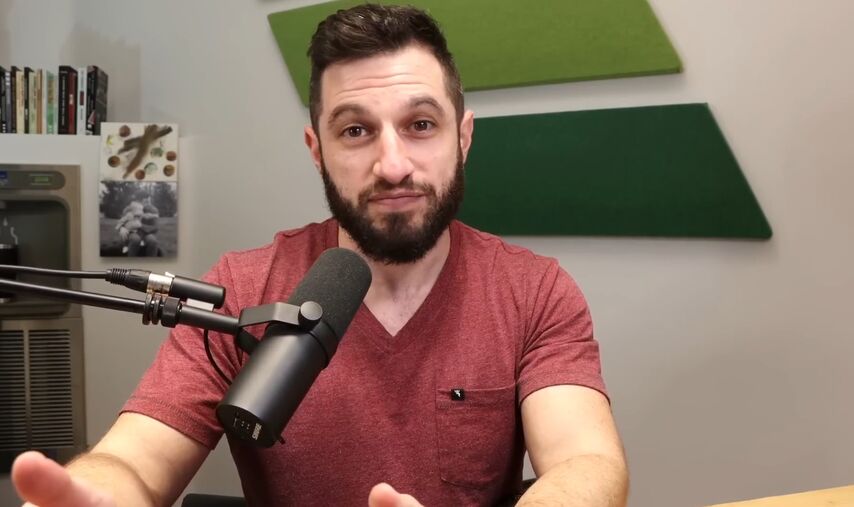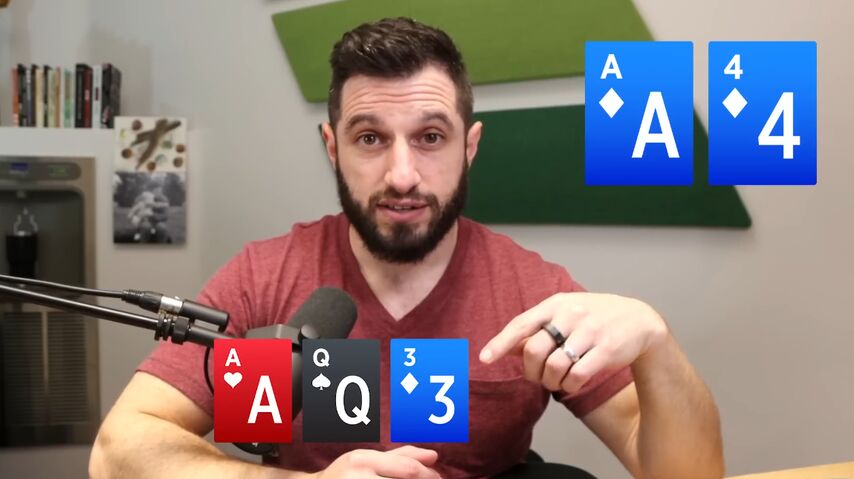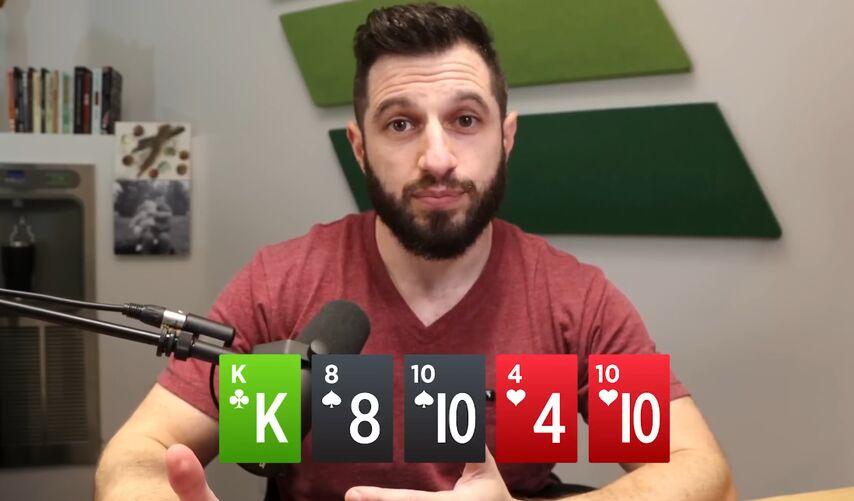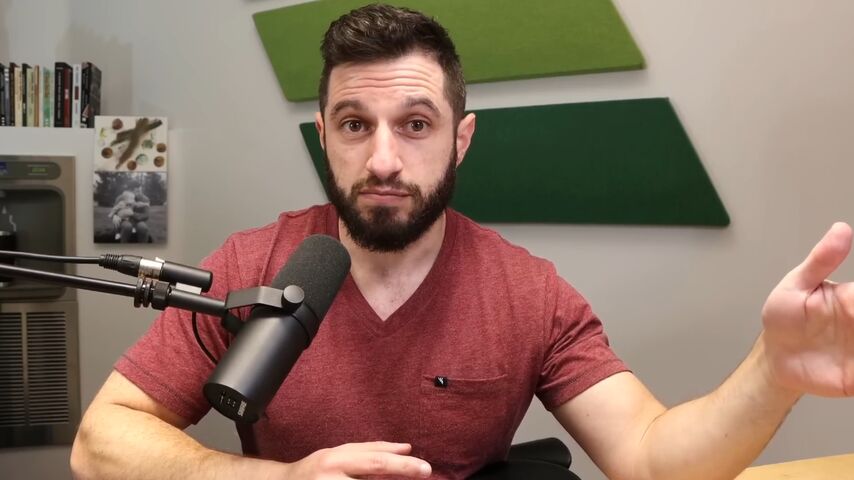Hello everyone, this is Phil, and today I want to talk about how to deal with those players who are not bluffing enough on the river. There are obvious adjustments at your disposal that you probably just thought of, but against such players we can profitably change our strategy not only on the river, but also on the turn and even on the flop. I'll also talk about one leak that happens to almost everyone I talk to about poker – the wrong approach to raising on the river.
Let's start with the obvious. When a person we suspect is not bluffing bets on the river and we have a hand that should sometimes call and sometimes fold, or even one that calls always or almost always but only beats a bluff, we should fold.
Poker is designed in such a way that, in optimal play, opponents should bluff the river with a certain frequency, which depends on the size of the pot and the chosen sizing, and we should defend in response with a precisely calculated part of our range. However, if Villain is bluffing much less frequently, the optimal counterstrategy is to fold all of our bluffcatchers, since calling with them will cost us money.
It's very simple and straightforward, and I'm just saying this to remind you again: when playing against these people, don't feel compelled to call with hands that you know for sure are GTO calls.
Now let's move on to more interesting topics.
Let's say the button raised and we defended the big blind with . Opened the flop . Checked, villain c-bet small, we paid.
Turn – we have two pairs. We check and our opponent checks back.
River – , our two pairs drastically losing strength. The usual strategy in this spot is to check-call because we have a weak kicker, a 10 could improve our opponent to trips, and we block a pair with the 4 that Villain could hero-call with. However, most of the value in this check-call comes from catching bluffs: we check, Villain bluffs, we call him with a perfect hand that blocks a lot of value and unlocks all missed draws. Alas, against an opponent who rarely or never bluffs, this consideration is not relevant.
Another reason the solver prefers to check-call is that after our bet on the river it will be very unpleasant to get check-raised – our opponent can credibly represent a ten. However, if he bluffs too infrequently, there is nothing to worry about! If we get a raise, we just fold.

It turns out that against a heavily non-bluffing opponent, it is better for us to bet the river ourselves – this line has practically no drawbacks. No checks or mixes, just always make a small bet – but who knows, with , With , let him come up with a reason and a hand to call. Here's another way to outplay a guy like that, besides the obvious "when he bets, we fold".
I'll talk about bluff check-raises a little later, but for now let's look at earlier streets. The further we move away from the fork in the game strategy, which reveals the play of our opponent, the less obvious our adjustments become. Let's start with the turn.
Let's take the flop as an example. and turn . Let's say a player in early position raises, we call in late position. Villain c-bets the flop and bets the turn.
Against a person who plays normal ranges, it's hard to resist in this situation with a hand like . We're losing to all draws, all of Villain's semi-bluffs have decent equity, and there are a lot of dangerous cards on the river that will often fold the best hand on the third barrel.
But against a person not bluffing on the river, ATo gets much stronger and we can consider calling. Notice I said "on the river". If Villain hates bluffs so much that he won't even bet a second barrel with a draw, calling the turn with ATo is bad – no matter how he plays the river, he's just going to have too much value on any river. But if he continues on the turn with the right range, with all sorts of , and a flush draw, but without bluffing, and it doesn’t fill on the river and he just gives up, calling with becomes good.
Other hands that play well against properly bluffing opponents are strong draws. , for example. Having strengthened on the river, we can get both a bet and a raise. Against people who aren't bluffing, the expectation of these draws drops. Of course I won't throw away on the turn, but with weaker flush draws, we might well give up (of course, the decision also depends on the size of the bet).
In general, not enough bluffs on the river from our opponent affects the relative strength of our hands on the turn. A medium-strength made hand with little hope of improvement suddenly becomes very valuable. It gives us the opportunity to comfortably call on the turn and fold to the third barrel without any fear, because very often we will see a check on the river, check and win at showdown.
Another example. The cutoff raises, we defend the big blind with . Flop – .

We check and our opponent checks.
Turn – , brings a flush draw.
Under normal circumstances, we have a good hand to check-call. One of the reasons the solver likes this line is that if we bet, we get called and the nuts change on the river, we are in a difficult position: bet too thin and you can run into a bluff raise, and after checking you can’t rep much. However, if your opponent doesn't like to bluff on the river, you can safely collect value by betting on the turn! On a perfectly safe river, you can bet one more time small. On a scare card, we check, not at all afraid that the opponent will turn his low pair or a missed gutshot with a high card with the king into a bluff.
Thus, being able to play the river more confidently, knowing that our opponent is not prone to bluffing, allows us to comfortably draw on the turn with hands that are not suitable for drawing in optimal play.
Let's step back a step – on the flop. Our adjustments on this street will be about the same as on the turn. Let's say a late player opened, we defended the BB with . Flop – . Moderately deep stacks. The optimal solver play in this situation is a mix between check-raising and check-calling. We have a strong hand, but the solver doesn't want to check-raise all the time, because he is afraid of losing against bluffs on the dangerous turn and river. But if Villain doesn't bluff on the river, we can check-raise for value on the flop. If Villain calls and the turn is – Well, we check. Then you can check-fold or check-call, depending on the size of the bet. But the main thing is that on the river we can safely fold to the continuation of aggression, because we are not afraid that we will be bluffed.
In conclusion, I want to touch on the topic of river raises a little. It seems to me that everyone has huge problems with this line – at the level of concepts.
Let's take the same board.

Under normal conditions, it's good to check-raise here, for example, or lower boats. But not against people who don't bluff much... Remember, our opponent checked the turn, so he has almost no strong king hands left – , . By blocking , we deprive him of a decent share of strong hands. There are no bluffs there either (or very few). So it probably makes sense to replace the check-raise with a donk bet. We just bet for value.
In general, I don't recommend getting into check-raising against people who don't bluff a lot on the river. This applies equally to value check-raises and bluff check-raises.
That's right, when we check-raise bluff on the river, we're attacking our opponent's draw hands, forcing him to fold his weakest hands. However, a good part of our expectation comes from folding with bluffs.
Let's say we check and face a pot-sized bet. With optimal play, a third of your opponent's range will be bluffs. Let's say we made a relatively small check-raise, after which our opponent should fold 50% of the hands and continue with the second half. But 33% of 50% of his folds are bluffs, and only 17% are thin draws (for a total of 67% draws). So, against a small raise, Villain should call with most of his value bets.
If in the same scenario Villain has 10% rather than 33% bluffs, our raise is trying to get him to fold 40% of 90% of his value bets. This is a lot and not very realistic. Bluff check-raises against those who don't bluff a lot on the river will cost us too much.

This is probably also a pretty obvious conclusion, but I often come across explanations like: “I understand that I should call with this hand, but the opponent is practically not bluffing, so calling is not good here. But I can raise! Maybe I'll get him off a few hands." No, if this person is just not bluffing, your check-raises will lose money. To make it winning, you need to know about another leak – a monstrous overfold to a raise.
And the general conclusion is that against people who do not want to bluff, we often take the initiative into our own hands and bet, bet, bet. We'll have to do the job for them! Also, our adjustments against such opponents should not start on the river, but on the flop and turn. We have the right to change our strategy and evaluate some categories of hands differently. For example, it's more aggressive to play with value hands, not being afraid to fold against a bluff on a dangerous river.
I hope my thoughts will be useful to you in the game. Good luck at the tables against those who bluff too rarely!











